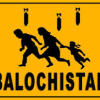Indian State Should Focus on Unconventional Methods: Jamal Nasir Baloch
The Alyan Kurdi and refugees of Balochistan

The Kurdish toddler Alyan Kurdi, his 5 years old brother and 35 years old mother died while fleeing from war-torn Syria when their boat sunk trying to reach the Greek island of Kos. They were among hundreds of thousands of people who were on their way seek refuge in Europe but Alyan and his family’s destination was Canada. The tiny dead body of Alyan Kurdi lying on the beach has attracted media attention around the world. Thousands of angry people also took to streets to urge the world leaders to support the refugees. Amidst growing anger and protests Germany eventually opened its border near Austria and announced to take in refugees from Syria.
The death of Alyan Kurdi was a big blow on face of international community and it has woken the morally unconscious leaders of world but only temporarily. In todays’ global village the tragedy is that humanity is limited to what the media shows or reports. Away from Syrian meadows and Turkey’s coast line there is a beautiful country surround by mountains named Balochistan. Where the Pakistan army and its proxy Jihadists groups have been carrying out crimes against humanity since 1948 when Pakistan illegally occupied Balochistan. According to UN reports at least 33000 Baloch children have become IDPs (Internally Displaced Persons) because of Pakistani state terrorism and 33% of these IDPs face malnutrition. So far 8-10 thousand children have died because of shortage of food but these Baloch Alyans are buried and immediately forgotten neither the world institutions nor the NGOs raise voice for them. The international media and humanitarian organisations follow the Pakistani narration – all is well in Balochistan.
The Baloch nation has been struggling for their freedom since the occupation of Balochistan by Pakistan in 1948. As part of its counter liberation struggle Pakistani forces have been violating human rights and committing war crimes by bombing civilian populations and extra-judicially arresting Baloch activists. Because of Pakistan’s indiscriminate bombardment and military operations thousands of Baloch fled their native villages and towns to seek refuge in neighbouring regions. In 1970s hundreds of thousands of Baloch migrated to Afghanistan to escape Pakistani state atrocities but death continued to haunt them even in exile because many hundred Baloch refugees in Afghanistan were killed by pro-Pakistan Islamic extremists [Mujahedeen] on the order of ISI and Pakistan military. The killers of Baloch refugees were paid substantial amount of money by ISI and army for per Baloch head.
The UN and other international humanitarian bodies turned a blind eye to the plight of Baloch refugees and have done nothing to protect and support them.
The latest phase of Baloch liberation struggle started in early 2000 when Pakistani military dictator General Pervez Musharraf declared war against Baloch people. As the military atrocities intensified in Marri and Bugti regions of Balochistan the inhabitants of these regions started migrating to what they thought would be safer places for them in Sindh and Punjab. In 2005 Pakistani forces bombed the house of Nawab Akbar Bugti and a Hindu Temple in Dera Bugti Balochistan killing dozens of Hindu Baloch men, women and children and forcing half of the population of Dera Bugti town of flee.
The Baloch resistance and military operations intensified after the Dera Bugti attack. Many people from Dera Bugti and Kohlu districts of Balochistan were forced to leave their villages. According a report by UN 84000 people including 26000 women and 33000 children have migrated from Dera Bugti and Kohlu alone in 2006. However, the Human Rights Commission of Pakistan (HRCP) reported that 50000 people were forced to migrate from Dera Bugti. Another fact finding commission from Pakistan reported that 250,000 people migrated from Dera Bugti and Kohlu districts after 2006 military aggressions in Balochistan and around 10,000 of them died due shortage of food.
Despite this humanitarian crisis Pakistan not only ignored the plight of Baloch IDPs but the Pakistani military has also prevented international organisations such as UNICEF and Pakistan’s Edhi Foundation from helping the Baloch refugees. By the passage of time as Pakistan expanded its military operations to different areas including Quetta, Khuzdar, Awaran, Makuran and several other regions of Balochistan forcing thousands of Baloch to become IDPs. The exact number of Baloch refugees is not clear because the international aid agencies are banned from visiting Balochistan.
Pakistani forces have intensified their operations in Makuran region of Balochistan since the beginning of China-Pakistan Economic Corridor. They have conducted several hundred military operations and abducted thousands of people. Due state atrocities half of the population of the areas have migrated.
A large number of Baloch people have fled to Afghanistan but the Pakistani intelligence agencies their agents continue to target them even in exile. Their houses were attacked on several occasions and many Baloch refugees in Afghanistan were target killed by ISI’s hired thugs. One of the recent examples of attacks on Baloch refugees is the murder of Paind Khan Bugti in Afghanistan two weeks ago.
The plight of Baloch refugees is as tragic as the Syrian refugees and other people who escaped war-torn countries. The refugee crisis in Balochistan is a great human tragedy but the world continues to ignore the Baloch-Pakistan conflict and the suffering of forced-displaced Baloch. The Baloch refugees in different area of Pakistan and in Afghanistan are being targeted on daily basis even those who managed to reach the safety of Europe and other Western countries are often either refused or have to wait for years to finally be recognised as refugees. The suffering of Baloch refugees mostly goes unnoticed by UNHCR and other international Human Rights Organisations because these institutions reply on narrative of Pakistani state and media. It is time the plight of Baloch refugees is heard and they are helped in accordance with international laws and UN conventions.









